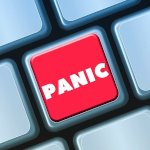International Panic Day Date in the current year: June 18, 2026
 International Panic Day is an unofficial holiday celebrated annually on June 18. Although it may seem humorous, the holiday actually raises awareness of a very serious issue that affects most people at least once in their lifetime.
International Panic Day is an unofficial holiday celebrated annually on June 18. Although it may seem humorous, the holiday actually raises awareness of a very serious issue that affects most people at least once in their lifetime.Panic is a sudden overwhelming sensation of fear that suppresses logical thinking and prevents people from acting rationally in critical situations. The word “panic” derives from the name of the ancient god Pan, who would give an angry shout when disturbed during his secluded afternoon nap, causing flocks to stampede.
The main danger of panic is that people are vulnerable to it; one person’s panic may spread to other people nearby, causing the entire group to act irrationally (this psychological phenomenon is known as emotional contagion). Mass panic occurring during public events may lead to people being injured or even dying in the trampling.
Sudden periods of intense panic accompanied by physical symptoms such as hart palpitations, shortness of breath, hyperventilation, sweating, trembling, shaking, dizziness, nausea, etc. are called panic attacks. They can either occur unexpectedly or be triggered. According to the Mental Health Foundation, over 13% of people have experienced a panic attack at some point in their life; about 2.5% of people are affected by panic disorder (reoccurring unexpected panic attacks).
People with panic disorder learn to manage panic attacks by using CBT (cognitive behavioral therapy) techniques. Even if you’ve never experienced a panic attack in your life, it is a good idea to learn some of these techniques in order to be prepared to help yourself or someone else in case of a panic attack.
- Breathe deeply. Since panic attacks typically involve hyperventilation, diaphragmatic breathing, also known as “belly breathing”, can help to restore the oxygen/CO2 balance in the blood. Try the 5—2—5 breathing exercise: inhale on the count of 5, hold your breath for 2 seconds, exhale on the count of 5. Repeat the cycle twice and return to breathing “normally”.
- Try muscle relaxation techniques. When you feel a panic attack coming on, tense and relax your muscles one by one, from your toes to your head.
- If you experience derealization (a feeling of unreality of the outside world) during a panic attack, try to focus on an object that will act like an anchor, keeping you in the present moment.
- You can try and nip a panic attack in the bud with the help of light aerobic exercise. It makes your body release endorphins, which create a feeling of mild euphoria, and decreases the levels of the stress hormone cortisol.
The most important thing in fighting panic is... not to actively fight it, because this will only increase your anxiety. Psychologists recommend that you acknowledge your panic and then distance yourself from anxious thoughts, using techniques such as mindfulness meditation and positive thinking.
International Panic Day should not be confused with a similar national holiday. National Panic Day, also referred to as simply Panic Day, is observed on March 9.
- Category
- International Observances, Unofficial Holidays
- Tags
- International Panic Day, international observances, unofficial holidays, panic attack, panic disorder